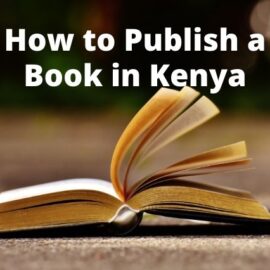
Author | Josephine Ngatia
A lot of authors grapple with this question. This is because we have traditionally known that once you write your manuscript, publishers should scramble for it. Not only that, but they will also pay the publishing cost, give you a handsome advance and pay you good royalties. When authors have failed to get a traditional publishing deal, they have become disappointed. Now they wonder, “Is self-publishing for me?”
The publishing industry has undergone a transformation, and we have seen the rise of self-publishing as an alternative to traditional publishing. Authors have woken up to the fact that if they sit and wait for a publishing miracle they will end up holding their manuscripts for years.
Self-publishing has become the alternative and is attracting authors by the day. It is the publishing model where you pay the cost upfront and get 1000 copies of your book. You get to keep 100% of the royalties when you sell your book copies.
When you consider the number of books traditional publishers can publish in a year compared to the number of authors with ready manuscripts, there is an imbalance. Self-publishing is the solution. After accepting this reality, the major concern you have is whether self-publishing is the direction you should take.
When is self-publishing the right option for you?
1) Traditional publishers have rejected your manuscript
If traditional publishers have rejected your manuscript, consider self-publishing. They have their requirements and if you don’t meet them, they won’t publish your book. Some of them have become hybrid publishers who offer both traditional and self-publishing services. When they are not willing to foot the publishing cost of your book, they will offer you their self-publishing service. This shows you the power of self-publishing.
Instead of sitting with your manuscript for years waiting for a publishing miracle, approach a company offering self-publishing services.
2) You want to keep the rights to your book
When you publish your book using the old model, the publisher pays the cost and expects you to surrender your book rights to them. This is to allow them to distribute your book through their channels. You cannot enter any other publishing deal for the purpose of selling your book. You can get copies and sell through your channels but there are certain restrictions.
For example, you can’t put your book on Amazon. The publisher would have to do it if they feel it will add value to the sale and marketing of your book. Some authors have given away rights to the print version of their book and keep the rights to the eBook version to allow them to sell it on online stores of their choice. If you want to keep all the rights to your book, self-publish it.
3) Publishers want to change your God-given message
This has been a concern for Christian authors and especially those who have a prophetic message for the body of Christ. There are some Christian publishers who want to edit out important points that God has revealed to you. They do it to make the book acceptable and marketable to a larger audience. Failure to change your message means the publisher cannot publish your manuscript.
In such a case, self-publishing becomes the avenue to get your message into the world. It is important for a publisher to listen to the voice of the Holy Spirit when publishing Christian manuscripts.
4) You have a platform to sell your print books
If you offer coaching classes, have a business office or any other platform that will allow you to sell your print books, you can self-publish it. Your platform will provide a location where buyers can get a copy of your book.
If you don’t have a platform and have to sell them from home, are you up to the challenge? You will be in charge of delivery, administration, accounting, sale and marketing of your book. Keep in mind that book stores prefer to work with publishers and not authors.
With self-publishing, the publisher hands you your 1000 book copies and you market and distribute them. This is the reality that other self-published authors don’t tell you when they are encouraging you to self-publish your book in order to have higher royalties.
5) You have time to manage your book
If you are working an 8 – 5 job, do you have the time to distribute, market and do the administration of your book? If not, then self-publishing is not for you. It will frustrate you especially when you come home to a stack of 900 books in your store months later and you have no clue how to sell them.
If you have a business office, you can sell copies from there and your staff can help. But if you are in employment, this is a tall order. If you have no time to manage the sale of your book, you can consider publishing an eBook only. It will be easier to manage.
6) You want to publish an eBook only
Some authors want to publish an eBook and forgo the print version. Publishing an eBook is faster and significantly cuts down your publishing cost. It is easy to manage because you do everything online from selling to marketing and receiving royalty payments. You can publish an eBook only when you don’t want to deal with print books or don’t have time to sell your book from home.
If you want to reach a global audience, an eBook is the way to go. Unfortunately, most publishers don’t offer publishing of an eBook as the only version. There are a few who do and you will find them online, like WordPower Publishing Kenya.
7) You desire higher royalties
If you want to keep 100% of your book royalties, then self-publishing is the way to go. Traditional publishers will pay you an average royalty of 10% of the retail price when they sell copies of your book. The percentage varies according to the publisher.
A word of caution when chasing higher royalties: you will incur marketing, distribution and other commissions if you are working with third parties and therefore you will not keep the entire royalty amount. For example, if the cost of publishing one unit of your book is Ksh. 100 and the retail price is Ksh. 300, you will make a profit of Ksh. 200. This is what many refer to as 100% royalty.
If you pay someone to market your book or sell through online distributors like Amazon, the amount will go down. Beware of the illusion of keeping 100%. You will definitely make more money per unit with self-publishing.
Listen to God’s advice
As you ponder whether self-publishing is for you, allow the Holy Spirit to guide you on the best path to take. If God gives you a message, He will direct you to the right publisher. Many self-published authors and experts will have lots of advice, but never exalt the advice of others over God’s advice. He says in Isaiah 30:1,
“Woe to the rebellious children,” says the Lord, “Who take counsel, but not of me, and who device plans, but not of my Spirit, that they may add sin to sin.”
Listen to the counsel of others, but always keep in mind what God told you about the publishing of your manuscript.
Some will advise you to self-publish for the wrong reasons. Do it for the right reasons and you will not have regrets.




It is my heartfelt desire to be a Christian author,would you guide me please?
Hi, I will get in touch with you on email.
You might also want to sell your ebooks on Muthurwa.com. It is a promising platform that targets Kenyan audience.
Thank you Jane for the information.